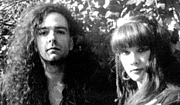
Click here to visit their page on MySpace.com, and here to watch video clips on their You-tube page.
Trouz Bras (pronounced "True Brazz" or arguably "Trooz brahz") means "Great Sound" in the Celtic language of Brittany, the ancient country that now finds itself in the northwestern region of France. It also translates as "Big Noise" - a reference to the loud Breton bagpipes that fuel the band's driving sound.
Devandaurae is a new musical project featuring:
other musicians yet to be announced on various exotic instruments.
About the Name: Devandaurae means 'God or Goddess of the Oak.'
So, 'deva' is 'goddess,' 'devon' is 'god,' and 'dara' is 'of the oak.'
Pronunciation: For you purists out there, the name should be pronounced as follows:
[DEH-wun THA-ruh] - the 'v' as written in Latin (by those who wrote down the Pictish
place-names) is pronounced like 'w' in English. The 'D' in 'dara' undergoes a sound
change called lenition, and is therefore pronounced like the 'TH' sound in the English
word 'bathe' (not like the 'th' in 'think.')
BUT
for the ease and comfort of the general populace, 'Devon Dara' will be fine!
 is a Celtic/Breton band which Sharynne recently performed with on vocals and woodwinds, marking her return to the music stage after several years away. (she is not currently performing with them). Click the band logo to visit their site for details on upcoming concerts and more information.
is a Celtic/Breton band which Sharynne recently performed with on vocals and woodwinds, marking her return to the music stage after several years away. (she is not currently performing with them). Click the band logo to visit their site for details on upcoming concerts and more information.
Catapulting traditional Breton dance tunes into the 21st century, Trouz Bras combines swirling bagpipes and soaring fiddle with a rocking rhythm section. The band is led by bagpiper and vocalist Ray Price, a native Welshman who has expanded his Celtic roots to become a global ambassador of Breton music and dance.

Sharynne MacLeod NicMhacha (vocals, Irish flute, pennywhistle, recorder, bodran,
dulcimer, harp and keyboards)
-and perhaps some surprise special guests!
Devandaurae's original and traditional songs draw their inspiration from Irish,
Scottish, Welsh and Cornish folk music; vocal and instrumental music from medieval
Scotland, Britain and France; and elements of early, ancient and primal music from
other cultures and traditions. Watch this site for CD and performance info!
It is comprised of three elements:
The first, 'deva' (or 'dewa') is a Pictish word meaning 'goddess'.
The middle part has two functions. Firstly, it reflects an early British suffix
(-on), which is used to show that something is sacred or divine. It is found in various
god names, as in the Welsh figure of Mabon (which means 'Divine Son'). Therefore, the
middle section can imply 'devon', signifying a male deity. (To us, the the sacred is both
masculine and feminine). The middle part also reflects Old Irish 'an', meaning 'the / of
the'
And finally, 'dara,' Old Irish for (of the) Oak.
This band has a myspace page now which can be seen here. There are no audio clips available yet, but stay tuned!

The Moors' CD has received airplay all over the United States, as well as in Canada, Britain, Scotland, France, Germany, Belgium, Chile, Israel and Hong Kong. It was voted 'Best CD of the Year' by the Noise Magazine upon its release, and received rave reviews across the board, in numerous magazines and websites nation-wide.
You may no longer order the Moors CD by logging onto the Castle von Buhler records website, as it is down. Shortly you will be able to electronically purchase Moors CD's directly through this site (on the 'Books, CD's and more' section) - We'll keep you posted! you may purchase them here the old fashioned way for now, (details below).
In the meantime you can read some reviews of the Moors here: Moors reviews.
For more Moors links:
Moors links
Moors CD's are $20.00 each (plus $3.00 each shipping and handling
in the continental US).
overseas orders please write to inquire
Please email for new postal address.
